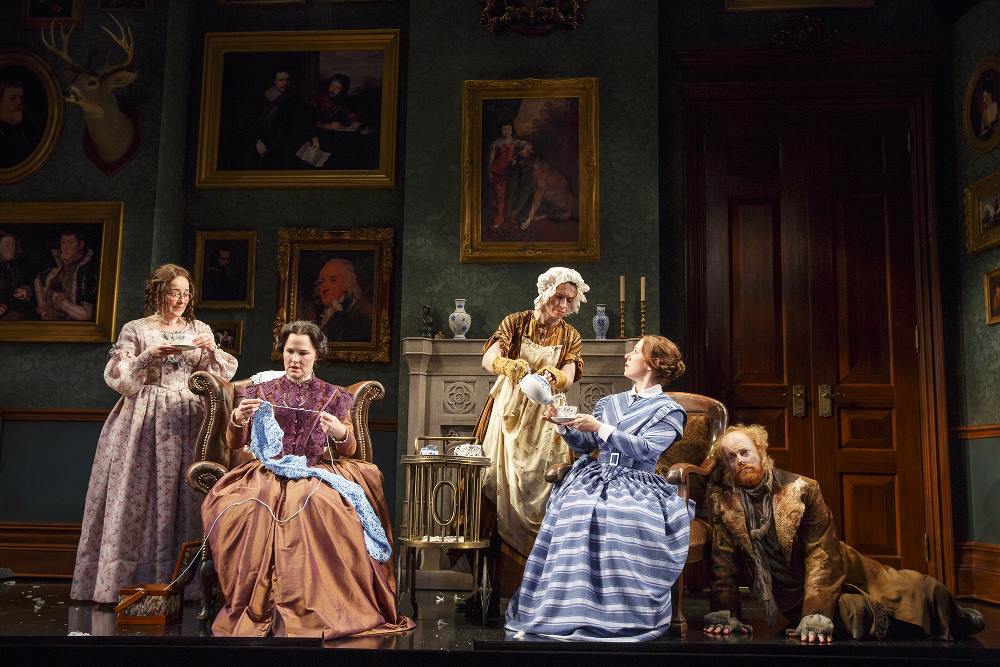NEW HAVEN, CONN.: Jen Silverman’s The Moors begins the way you’d expect a Victorian Gothic tale to: with fog rolling in around a gloomy old English mansion where two spinster sisters live among heavy upholstery and deep thoughts.
But wait—something is not quite right. In the world premiere production running at Yale Repertory Theatre through Feb. 20, the sisters speak without English accents. No one speaks with an accent, in fact, and there’s something decidedly contemporary in the script’s vernacular. A governess arrives to find she has no child to govern. The maid walks around with an attitude. And the family dog regularly has existential discussions about the meaning of life and happiness with a local moor hen who nests nearby.
Silverman first read Gothic classics Jane Eyre and Wuthering Heights when she was young, and she revisited the titles while studying comparative literature at Brown University. While those novels—with their trappings of mystery, melodrama, murder, and longing—certainly influenced The Moors, Silverman did not want her play to seem like a literary or historical adaptation. “That’s the reason we have the actors speaking in an American accent,” she explains. “This is a very contemporary and American play, and to those ends the moors represent something more than what they are.”
Silverman was inspired by the letters Charlotte Brontë wrote about daily household life on the Yorkshire moors. “The sense of location permeated the letters [and] emerged as a character,” says Silverman. “It mesmerized me and it made me think about how people condition themselves against such a bleak and unworldly landscape, and how that relative inhospitality offers a kind of permission—particularly for women—to let them dream in a way they might not otherwise.”
The playwright says her fascination with place and how it influences people “probably has a lot to do with the many places I lived.” The daughter of scientists, Silverman grew up in Asia, Europe, and the U.S. , and attended high school in Simsbury, Conn.

The titular location in The Moors, in all of its rugged wildness, is a metaphor for “freedom and strength, without structure, where people can reinvent themselves,” Silverman explains. And it can also bring out untapped potential, particularly in the arrival of the governess, Emilie. “When Emilie arrives at the sisters’ home, at first she is still rooted in the strictures of society, saying, ‘A woman is not capable of x, y, and z,'” Silverman says. “And [one of the sisters], Agatha, says, ‘You don’t know what women are capable of because you’ve been out in the world listening to the wrong voices.’ Over the [course of the] play, Emilie discovers she’s capable of a lot more than she thought she was.”
Director Jackson Gay was drawn to the play’s sense of existential loneliness, and its surreal examination of the meaning of life. “There is something so charming and generous in how Jen has written it,” says Gay, who has also helmed Elevada, These Paper Bullets!, and The Intelligent Design of Jenny Chow at Yale Rep. “Everybody in the play, even when they are behaving badly, makes you laugh, but you also forgive them because you recognize something in yourself, too, and that makes it funny. Jen writes with that kind of truthful loopiness.”
That slightly tilted perspective and “loopiness” can be found in Silverman’s other plays as well. In Still, which received the Yale Drama Series Award in 2013, a giant dead baby wanders the world with its best friend, a dominatrix. The Dangerous House of Pretty Mbane, which is set in South Africa and deals with homophobia, opens with a woman talking to a yellow dog. And in The Roommate, produced in 2015 at the Humana Festival of New American Plays at Actors Theatre of Louisville, a middle-aged woman keeps house with a new female roommate. Sexual tension and complicated backstories ensue.
Though the backdrops differ, “The thread,” says Silverman, “is a sense of theatricality and an interest in putting women onstage, particularly queer women, and with my interest in having conversations about power and visibility.”
These are complicated topics that aren’t presented often in the American theatre, particularly with female protagonists at the center. “I understand that it is a risk to take because I am an emerging playwright,” Silverman says. “Things that interest me are not necessarily naturalistic kitchen-sink dramas or the type of plays they already have an audience base for.” One artistic director, she recalls, advised her to write more like playwright A.R. Gurney. “I appreciate his plays,” she says. “But I don’t want to write them.”
Indeed, Silverman’s feminist viewpoint appealed to Jennifer Kiger, associate artistic director and director of new play programs at Yale Rep. “[The Moors] may be inspired by tales such as Wuthering Heights or Turn of the Screw, taking the trappings of Victorian storytelling—of sublimated eroticism, melodrama, societal ills, and particularly the depiction of women living in those terrible living conditions,” explains Kiger. “But then [Jen] subverts it for a contemporary audience. She makes it incredibly fresh. It feels like it could be about people today.”
Frank Rizzo lives in New Haven and New York and writes about theatre for Variety, Hartford Courant, The New York Times, Playbill, and other publications.


